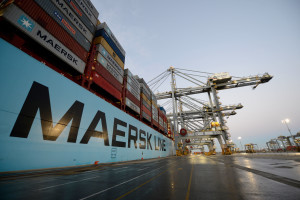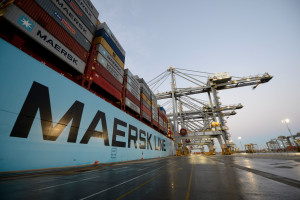Maersk is joining forces with IBM to launch a company to use blockchain technology to offer a global trade digitisation platform built on open standards and designed for use by the entire global shipping ecosystem.
 More than $4 trillion in goods are shipped each year, and more than 80 per cent of the goods consumers use daily are carried by the ocean shipping industry. The partners estimate that the cost of trade documentation and administration is up to one fifth of the cost of the physical transport.
More than $4 trillion in goods are shipped each year, and more than 80 per cent of the goods consumers use daily are carried by the ocean shipping industry. The partners estimate that the cost of trade documentation and administration is up to one fifth of the cost of the physical transport.
And the World Economic Forum estimated that by reducing barriers within the international supply chain, global trade could increase by nearly 15 per cent, boosting economies and creating jobs.
Blockchain’s distributed ledger technology establishes a shared, immutable record of all the transactions that take place within a network and then enables permissioned parties access to trusted data in real time.
By applying the technology to digitise global trade processes, a new form of command and consent can be introduced into the flow of information, empowering multiple trading partners to collaborate and establishing a single shared view of a transaction without compromising details, privacy or confidentiality.
“This new company marks a milestone in our strategic efforts to drive the digitisation of global trade. The potential from offering a neutral, open digital platform for safe and easy ways of exchanging information is huge, and all players across the supply chain stand to benefit,” said Vincent Clerc, chief commercial officer at Maersk and future chairman of the board of the new joint venture.
IBM and Maersk began a collaboration in June 2016 to build new blockchain- and cloud-based technologies. Since then, multiple parties have piloted the platform including DuPont, Dow Chemical, Tetra Pak, Port Houston, Rotterdam Port Community System Portbase, the Customs Administration of the Netherlands, US Customs and Border Protection.
The joint venture will enable IBM and Maersk to commercialise and scale their solutions to a broader group of global corporations, many of whom have already expressed interest in the capabilities and are exploring ways to use the new platform, including: General Motors and Procter and Gamble to streamline the complex supply chains they operate; and freight forwarder and logistic company, Agility Logistics, to provide improved customer services including customs clearance brokerage.
Additional customs and government authorities, including Singapore Customs and Peruvian Customs, will explore collaborating with the platform to facilitate trade flows and enhance supply chain security. The global terminal operators APM Terminals and PSA International will use the platform to enrich port collaboration and improve terminal planning. With support from Guangdong Inspection and Quarantine Bureau by connecting to its Global Quality Traceability System for import and export goods, the platform can also link users to important trade corridors in and out of China.
The new company initially plans to commercialise two core capabilities aimed at digitising the global supply chain from end-to-end:
– A shipping information pipeline will provide end-to-end supply chain visibility to enable all actors involved in managing a supply chain to securely and seamlessly exchange information about shipment events in real time.
– Paperless Trade will digitise and automate paperwork filings by enabling end-users to securely submit, validate and approve documents across organisational boundaries, ultimately helping to reduce the time and cost for clearance and cargo movement. Blockchain-based smart contracts ensure all required approvals are in place, helping speed up approvals and reducing mistakes.
Upon regulatory clearance, solutions from the joint venture are expected to become available within six months.
The new company will be headquartered in the New York metropolitan area.







